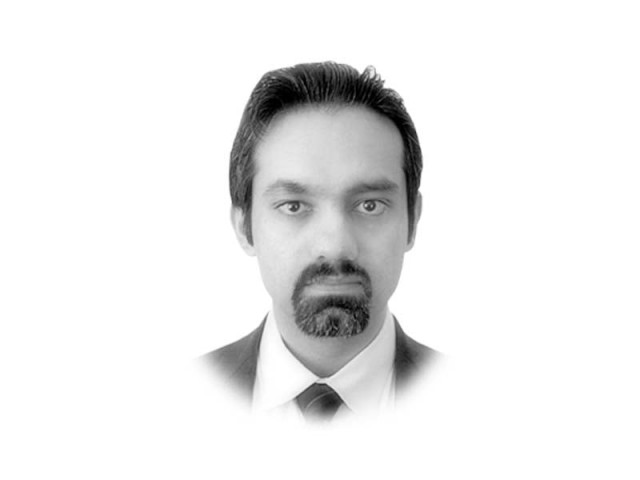The fallacy of the PML-N’s allegations
The PML-N’s statements about the SKMT are based on shoddy analysis and mistaken assumptions.

But, it was bad homework. And bad homework is worse than no homework, since it tends to misrepresent. And, without a doubt, the research and analysis that formed the basis of the PML-N’s attack on the SKMT was of inferior quality.
As a student of law and management at Yale, I have studied the endowment management model used by Yale University. The result of my academic inquiry was a presentation at the Yale School of Management that compared investment strategies used by organisations, including Harvard, Princeton and Yale universities, as well as sovereign wealth funds, such as Norway’s.
There is a simple response to the PML-N’s allegations levelled against the SKMT. Give any first-year student of law, finance or politics two hours and access to the internet, and he or she will be able to tell you the erroneous nature of the allegations. First, the PML-N’s leadership compared the SKMT’s method of investment with the Ponzi scheme run by ‘Double Shah’. This is a fantastic accusation. In the US, it would be akin to putting Bernard Madoff’s investment firm and Harvard’s and Yale’s endowments in the same category of fraudulent institutions. If any US politician made such an irresponsible statement, he would at least be severely chastised by his party, if not forever banished from politics.
Second, Khawaja Asif has accused the SKMT of money laundering. The SKMT’s investment would be the first instance of ‘laundering’ that has been disclosed on the organisation’s own website. International investment laws are well-defined and the kind of investment in real estate made by the SKMT does not fall into the category of money laundering, which is by definition a secretive process.
Third, Mr Asif alleges that the SKMT board “gambled” with the donor’s money. He has to be using a definition of gambling that no legal jurisdiction has recognised in modern history.
Fourth, in an interview, Mr Asif conveniently made several incorrect claims about the Harvard endowment fund. He claimed that when Harvard invests, it does so only in the US, not in foreign countries. This is inaccurate and goes against the core investment philosophy of sophisticated endowment funds, which try to minimise risk by geographical diversification. Yale, for instance, invested nearly 10 per cent of its endowment fund in foreign equity in 2011, including in emerging markets.
Fifth, Mr Asif further claims that entities such as Harvard’s and Yale’s endowments invest only in AAA investment grade securities. What he does not know is that these are bond credit ratings applicable to fixed income securities. In 2011, Yale invested only 3.9 per cent of its endowment in such securities. In fact, since the capital invested by the SKMT in Cinnabar is secured by guarantee, it is less risky than the bulk of investment strategies used by Harvard and Yale.
Sixth, the PML-N appears to have been fascinated with the idea of “offshore” jurisdictions. One of the largest and most respected endowment funds in the world is Norway’s Pension Fund Global, which has, perhaps, the highest standards for investment approval. The Norwegian endowment fund also invests in companies incorporated in offshore jurisdictions, including the British Virgin Islands. These offshore jurisdictions are not primarily havens for money launderers, which appears to be the only purpose for their existence in the minds of the PML-N leadership. They are also jurisdictions in which thousands of legitimate business firms are incorporated, including subsidiaries of some large global companies such as Coca Cola, Oracle, Seagate and Del Monte.
Seventh, Mr Asif has accused the SKMT of investing in a shell corporation, created for the special purpose of siphoning off donor’s money. In fact, the SKMT’s $3 million investment comprises 10.52 per cent of the investment fund. No corporate lawyer or judge would consider the investment firm undercapitalised from the perspective of the SKMT’s investment, given its relatively small share in the pool.
Eighth, the PML-N has blamed the SKMT for making speculative investments, which led to a loss of donor’s contributions. Anyone with the web searching skills of a teenager and the acumen of a first-year college student would have done well to check how comparable funds performed in the same time period. In 2008-2009, nearly all the best managed endowment funds lost money. Harvard’s fund lost $10 billion experiencing a 27.3 per cent decline, whereas Yale endowment shrank by 30 per cent.
In politics, anything goes, or so believe traditional politicians in Pakistan. But some public statements lie beyond the tipping point of shoddiness and inaccuracy, such that they seem uncivilised and in bad taste. One hopes that journalists and political analysts, in their role as public intellectuals, will guide society by calling spade a spade and revealing the factual and logical inaccuracies in the PML-N’s allegations. In fact, the political community must be actively informed that the SKMT’s endowment fund is not an aberration, but a standard practice used by the best non-profit institutions in the world to ensure institutional sustainability.
Pakistan is a country of talented people. Our diaspora is well-respected in the West as being solid professionals across many fields. I don’t see any reason why we should accept inferior acumen when it comes to politics and public service. The PML-N’s statements about the SKMT are based on shoddy analysis and mistaken assumptions. That research was not done prior to making the allegations shows that the actors involved may not be fit to govern the country in a complex age of globalisation.
Published in The Express Tribune, August 6th, 2012.














COMMENTS
Comments are moderated and generally will be posted if they are on-topic and not abusive.
For more information, please see our Comments FAQ